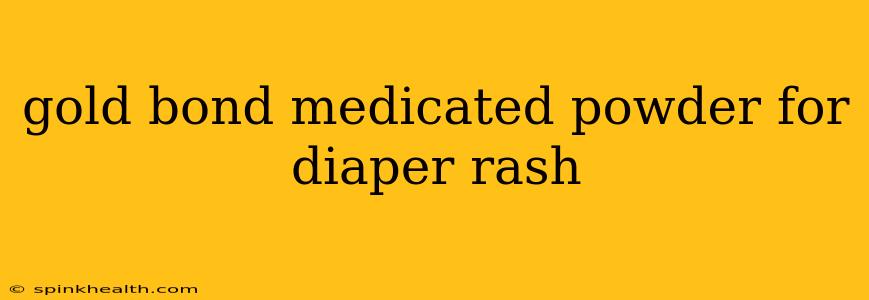The sweet smell of baby powder is often associated with happy, healthy babies. But for parents grappling with the painful reality of diaper rash, the question becomes: Can Gold Bond Medicated Powder truly help? The answer, like many things in parenting, is nuanced. Let's delve into the world of Gold Bond and diaper rash relief.
My journey into the world of diaper rash began, as it does for so many parents, with sleepless nights and a frustrated little one. My firstborn, Liam, suffered from a particularly nasty case of diaper rash. After trying numerous creams and ointments with limited success, a well-meaning friend suggested Gold Bond Medicated Powder. Intrigued, I decided to give it a try.
Does Gold Bond Medicated Powder Help with Diaper Rash?
Gold Bond's primary function is to absorb moisture and reduce friction. This can be beneficial in managing diaper rash, as moisture and chafing are major contributing factors. The medicated version contains ingredients like zinc oxide, which has mild antiseptic and astringent properties, potentially aiding in healing. However, it's crucial to remember that Gold Bond isn't a cure-all.
The key here is understanding the type of diaper rash. Gold Bond can be helpful for mild rashes characterized by redness and irritation. The powder helps keep the area dry, which can prevent further irritation and promote healing. But for severe rashes involving blisters, open sores, or signs of infection (like pus or fever), Gold Bond is not the primary solution. In those cases, a visit to the pediatrician is crucial.
What are the Active Ingredients in Gold Bond Medicated Powder?
This is a common question amongst parents looking for solutions. Gold Bond Medicated Powder typically contains Zinc Oxide and Talc. Zinc Oxide acts as a protectant and helps create a barrier against further irritation. Talc helps absorb moisture. However, it's worth noting that concerns regarding talc's safety have been raised in the past. Always check the product label for the most up-to-date ingredient list and consult with your pediatrician if you have any concerns.
Is Gold Bond Medicated Powder Safe for Babies?
While Gold Bond is generally considered safe for adults, using it on babies requires caution. Always check the product label to ensure it's suitable for babies. Avoid inhaling the powder, as this can be harmful to the lungs. Apply a thin layer to the affected area, ensuring it doesn't get into the baby's eyes or mouth. And, of course, consult your pediatrician before using any new product on your baby's delicate skin.
How to Use Gold Bond Medicated Powder for Diaper Rash?
Applying Gold Bond Medicated Powder is straightforward. Make sure your baby's diaper area is clean and dry. Then, gently apply a thin layer of powder to the affected area. Avoid applying too much, as excessive powder can clump and further irritate the skin. Change diapers frequently to prevent moisture buildup.
Can I Use Gold Bond Medicated Powder with Other Diaper Rash Treatments?
This depends entirely on the other treatment. Always consult your pediatrician or the instructions on your other diaper rash creams or ointments. Some products may react negatively when combined. It's best to stick to one treatment at a time unless otherwise directed by a medical professional.
What are the Alternatives to Gold Bond Medicated Powder for Diaper Rash?
Several other options exist for managing diaper rash. Many parents swear by various diaper rash creams containing zinc oxide, petroleum jelly, or other soothing ingredients. Some opt for natural remedies like coconut oil or aloe vera. However, remember that every baby's skin is different, and what works for one might not work for another.
My experience with Gold Bond Medicated Powder was mixed. It provided some relief for Liam's mild rash, but it wasn't a miracle cure. For more severe episodes, we relied on our pediatrician's recommendations. Ultimately, the key to managing diaper rash lies in prevention (frequent diaper changes, keeping the area clean and dry) and seeking professional help when necessary. Remember, this information is for general knowledge and should not substitute professional medical advice. Always consult your pediatrician for any concerns regarding your child's health.

